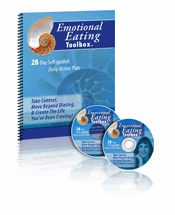 The term emotional eating is used a lot, but not everyone understands what emotional eating really is.
The term emotional eating is used a lot, but not everyone understands what emotional eating really is.
Emotional eating is eating and overeating that occurs when we use food as a way to cope with a feeling, situation, or a need that is not physical hunger. Emotional eating is eating that happens when we want to eat but our bodies don’t really need the fuel. Common kinds of emotional eating are “nervous eating,” eating when you are bored, using food as a “reward” (to feel good), or eating when you are lonely. Because this kind of eating isn’t tied to a physical need for food, it can easily cause weight gain.
Here are three things everyone trying to lose weight needs to know about emotional eating:
1. Many people don’t know that they are emotional eaters. How’s that? Well, emotional eating isn’t always as straightforward as feeling a feeling (“I’m anxious”) and then making a choice to eat. Here’s the tricky part. Over time, if you’ve learned to use food as a way to cope with certain feeling states or situations, your brain can stop identifying that you are eating for emotional reasons. Here’s an example. If when you’re stressed, you reach for a snack to comfort yourself, over time, your brain stops telling you, “You are stressed and you are going to try to cope with it by eating a cookie.”
Over time, your brain may start skipping the emotion and move directly to interpreting that stressed feeling as physical hunger. You might not even realize that you are feeling stress. Your thinking will go like this: Something stressful will happen and you will start wanting a snack. You might even feel physically hungry. Food, not stress, will be the central thought in your mind. If you are someone who feels hungry “all the time,” emotional eating could very well be playing a hidden role.
2. Emotional eating and self-blame, shame and guilt go hand in hand. If you are feeling “out of control with your eating,” odds are that emotional eating is happening. The problem is, if emotional eating goes unrecognized, or if we don’t take it seriously, it’s easy to fall into a trap of guilt and self-blame for not being able to “stay in control” of your eating.
Shame and guilt are never helpful when it comes to long term weight loss. They tend to breed isolation, negative self esteem, decreased hope, and ultimately more emotional eating and self-sabotage. If you are struggling with emotional eating and you don’t learn the tools you need to cope with the feelings, the odds are that you will continue to feel out of control with food.
3. If you don’t take control of emotional eating, it can take control of your weight loss plans. Research studies of individuals trying to lose weight find that people who eat for emotional reasons lose less weight and have a harder time keeping it off. The journal Obesity recently published an article concluding that successful weight loss programs should teach clients how to cope with emotional eating in order to improve the clients’ ability to lose weight and not regain it.
If emotional eating is something that you struggle with, it’s important to know that no diet, no fitness program, and no weight loss surgery will fix that for you.
Taking control of emotional eating requires learning new effective ways to cope with your emotions. It’s not about the food.
It’s also important to know that learning new tools to cope with emotional eating can be one of the most rewarding and life-changing gifts that you can give yourself. Learning new ways to cope with life issues and feelings allows you to tackle life head-on. When you do this, food becomes simpler, and your life grows bigger, and ultimately, more rewarding.
Take good care,
Melissa
Friday, May 16, 2008
Mistakes That Sabotage Weight Loss and Contribute to Emotional Eating: Part Two
Posted by
Melissa McCreery, PhD
at
4:18 PM
![]()
![]()
Labels: bariatric surgery, emotional eating, mindful eating, stress eating, weight loss
Subscribe to:
Post Comments (Atom)








2 comments:
I hope that I can overcome this and stop killing my self. Thik you for thistopic.
Anonymous,
Don't underestimate the value of support. I hope the information that I provide is useful, but look for supportive resources and people who can help you out as well.
Take good care!
Post a Comment